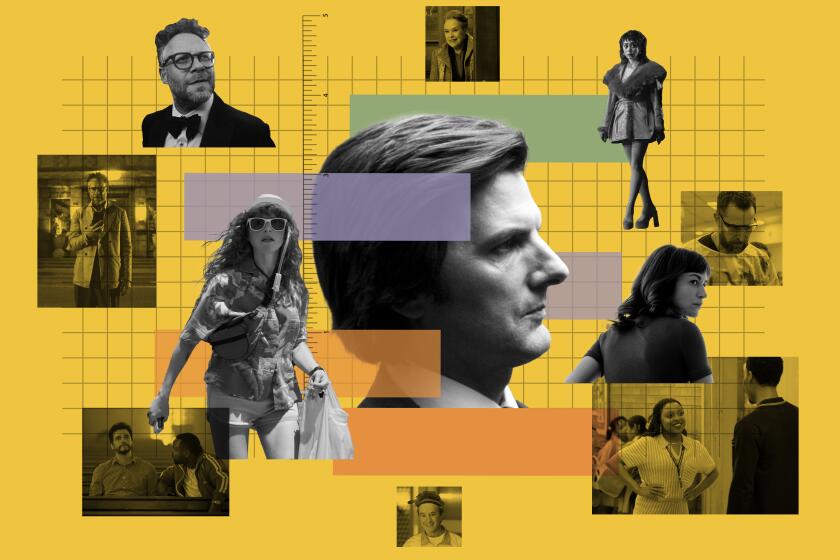The Envelope: ‘A Most Violent Year,’ ‘Foxcatcher,’ ‘Nightcrawler’ and social climbers
- Share via
In “A Most Violent Year,” Oscar Isaac plays Abel Morales, a New York heating-oil magnate who owns a lavish new home and a port-side storage facility — on paper, anyway. While Abel scrambles to borrow the money to close the biggest deal of his life, rivals are hijacking his trucks, the FBI is investigating his business and his wife, Anna (played by Jessica Chastain), is trying to lend a hand by using tactics she learned from her mobster father.
From the outside, Abel looks like a prosperous man and a respected part of New York’s moneyed elite. But as writer-director J.C. Chandor’s movie begins, Abel’s just a few bad days away from losing everything.
It’s not unusual for the fall movie season to be crowded with serious films about people desperate for success. But 2014 is seeing a number of award contenders — “A Most Violent Year,” “Foxcatcher,” “Nightcrawler” and “Big Eyes” — that are specifically about what it takes to climb the social ladder in America, and whether it’s worth the effort.
In the case of “Year,” Isaac’s Abel prides himself on running a clean business in an industry with deep ties to organized crime. But “clean” is a relative term in the oil game in 1981, when the film is set. Like his competitors, Abel and his wife cheat customers and fudge their figures just enough to gain an advantage. An immigrant and former truck driver who clawed his way to the top, Abel is confident that he made it through hard work and shrewd decisions. As the film plays out, Abel will question whether he’s really all that different from the real crooks and their hired gunmen.
Whereas “A Most Violent Year” openly tallies the costs of material success, Bennett Miller’s true-life crime story “Foxcatcher” is a little more subtle about it. By the time the closing credits roll, though, the director and screenwriters E. Max Frye and Dan Futterman have painted all three of their lead characters as motivated by some kind of greed or desperate desire for respect.
That’s true even of John du Pont, the eccentric millionaire played by Steve Carell. Determined to be taken seriously by his accomplished old-money family — and particularly by his mother, Jean (Vanessa Redgrave) — Carell’s Du Pont comes across as a man who’s trying too hard as he pours his fortune into training and mentoring Olympic wrestlers. Still, Du Pont’s money and social standing are real enough, which helps convince working-class brothers Mark and Dave Schultz (Channing Tatum and Mark Ruffalo, respectively) that he can help them become not just world-renowned wrestlers but also comfortably prosperous.
Du Pont’s twisted sense of himself and the respect he believes is his due are mirrored in writer-director Dan Gilroy’s “Nightcrawler” and its main character, Lou Bloom (Jake Gyllenhaal), a freelance video-journalist who seems to have memorized and internalized every business seminar he’s ever seen online. The amoral Bloom supplies local news producer Nina (Rene Russo) with bloody, ratings-grabbing crime-scene footage and can demand higher and higher fees the more he amps up the graphic elements, until he’s created a thriving business of his own.
In “Big Eyes,” on the other hand, Walter Keane (Christoph Waltz) is a personable gentleman, interviewed for newspapers and television to talk about his wildly popular series of paintings of sad little children with enormous eyes. Except that Keane didn’t actually paint them — his wife, Margaret (Amy Adams), has been toiling away at home on the paintings while her husband, a failed artist, uses his charisma to garner the spotlight and the riches he has so long craved.
All four of these characters — Abel Morales, John du Pont, Lou Bloom and Walter Keane — have a line of patter that build themselves up to others, but deep down, they’re all really talking into a mirror, selling themselves on a path they’re determined to travel.
Abel in “A Most Violent Year” is at least a nice, grounded guy with stable relationships. But there’s a moment in Chandor’s film that speaks to what the movie is really about — and maybe what all these have-and-have-not stories this season are about. When Abel’s lawyer Andrew (Albert Brooks) asks him why he wants so badly to grow his business, Abel eventually has to shrug and admit that he doesn’t understand Andrew’s question. This is just what’s done: If there’s money to be made, the only sensible thing is to try to grab some of it.
Taken together, the films sketch a portrait of an America in which the pursuit of success drives people to some dicey decisions, risking lives and livelihoods in hopes of something elusive, and possibly illusory.
More to Read
Sign up for The Envelope
Get exclusive awards season news, in-depth interviews and columnist Glenn Whipp’s must-read analysis straight to your inbox.
You may occasionally receive promotional content from the Los Angeles Times.










